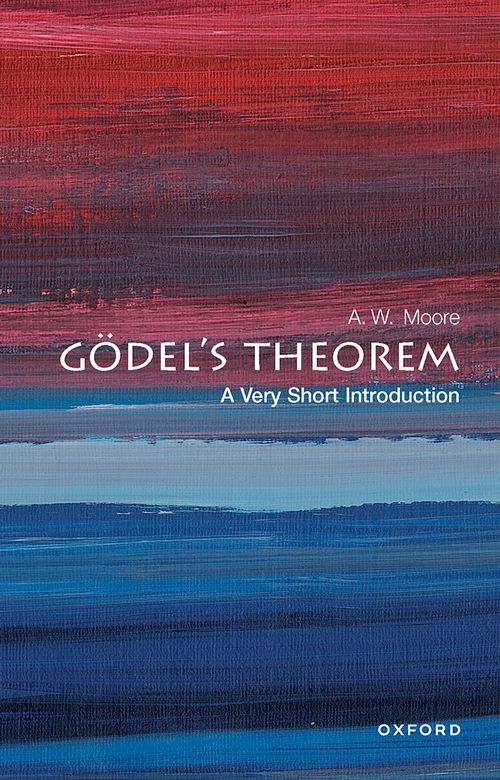Home >
A Very Short Introduction >
Gödel's Theorem (Mathematics)
A Very Short Introduction | Mathematics
Gödel's Theorem
ISBN: 9780192847850
Series: A Very Short Introduction
Gödel's Theorem (Mathematics)
A Very Short Introduction Gödel's Theorem (Mathematics) Media > Books > Non-Fiction > Education Books Expect Delays of Up to 4 Weeks| Order Below |
ISBN
9780192847850 (10-digit ISBN: 0192847856)
- Description
- Key Features
- Series Description
- Table of Contents
- Places Gödel's famous theorem in its intellectual and historical context, while explaining the key concepts
- Gives two proofs of the theorem
- Considers common misunderstandings associated with the theorem
- Discusses the theorem's most important philosophical implications
Kurt Gödel first published his celebrated theorem, showing that no axiomatization can determine the whole truth and nothing but the truth concerning arithmetic, nearly a century ago. The theorem challenged prevalent presuppositions about the nature of mathematics and was consequently of considerable mathematical interest, while also raising various deep philosophical questions. Gödel's Theorem has since established itself as a landmark intellectual achievement, having a profound impact on today's mathematical ideas. Gödel and his theorem have attracted something of a cult following, though his theorem is often misunderstood.This Very Short Introduction places the theorem in its intellectual and historical context, and explains the key concepts as well as common misunderstandings of what it actually states. Adrian Moore provides a clear statement of the theorem, presenting two proofs, each of which has something distinctive to teach about its content. Moore also discusses the most important philosophical implications of the theorem. In particular, Moore addresses the famous question of whether the theorem shows the human mind to have mathematical powers beyond those of any possible computer
Oxford's Very Short Introductions series offers concise and original introductions to a wide range of subjects--from Islam to Sociology, Politics to Classics, Literary Theory to History, and Archaeology to the Bible.
Not simply a textbook of definitions, each volume in this series provides trenchant and provocative--yet always balanced and complete--discussions of the central issues in a given discipline or field. Every Very Short Introduction gives a readable evolution of the subject in question, demonstrating how the subject has developed and how it has influenced society. Eventually, the series will encompass every major academic discipline, offering all students an accessible and abundant reference library.
Whatever the area of study that one deems important or appealing, whatever the topic that fascinates the general reader, the Very Short Introductions series has a handy and affordable guide that will likely prove indispensable.
Please note: As this series is not ELT material, these titles are not subject to discount.
1: Introduction
2: The appeal and demands of axiomatization
3: Historical background
4: The key concepts involved in Gödel's theorem
5: The diagonal proof of Gödel's theorem
6: A second proof of Gödel's theorem, and a proof of Gödel's second theorem
7: Hilbert's programme, the human mind, and computers
8: Making sense in and of mathematics
Kurt Gödel first published his celebrated theorem, showing that no axiomatization can determine the whole truth and nothing but the truth concerning arithmetic, nearly a century ago. The theorem challenged prevalent presuppositions about the nature of mathematics and was consequently of considerable mathematical interest, while also raising various deep philosophical questions. Gödel's Theorem has since established itself as a landmark intellectual achievement, having a profound impact on today's mathematical ideas. Gödel and his theorem have attracted something of a cult following, though his theorem is often misunderstood.This Very Short Introduction places the theorem in its intellectual and historical context, and explains the key concepts as well as common misunderstandings of what it actually states. Adrian Moore provides a clear statement of the theorem, presenting two proofs, each of which has something distinctive to teach about its content. Moore also discusses the most important philosophical implications of the theorem. In particular, Moore addresses the famous question of whether the theorem shows the human mind to have mathematical powers beyond those of any possible computer
Key Features
- Places Gödel's famous theorem in its intellectual and historical context, while explaining the key concepts
- Gives two proofs of the theorem
- Considers common misunderstandings associated with the theorem
- Discusses the theorem's most important philosophical implications
Series Description
Oxford's Very Short Introductions series offers concise and original introductions to a wide range of subjects--from Islam to Sociology, Politics to Classics, Literary Theory to History, and Archaeology to the Bible.
Not simply a textbook of definitions, each volume in this series provides trenchant and provocative--yet always balanced and complete--discussions of the central issues in a given discipline or field. Every Very Short Introduction gives a readable evolution of the subject in question, demonstrating how the subject has developed and how it has influenced society. Eventually, the series will encompass every major academic discipline, offering all students an accessible and abundant reference library.
Whatever the area of study that one deems important or appealing, whatever the topic that fascinates the general reader, the Very Short Introductions series has a handy and affordable guide that will likely prove indispensable.
Please note: As this series is not ELT material, these titles are not subject to discount.
EASY ORDER FORM
PRICES LISTED INCLUDE CONSUMPTION TAX
Price Before Tax:
¥1,790


